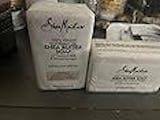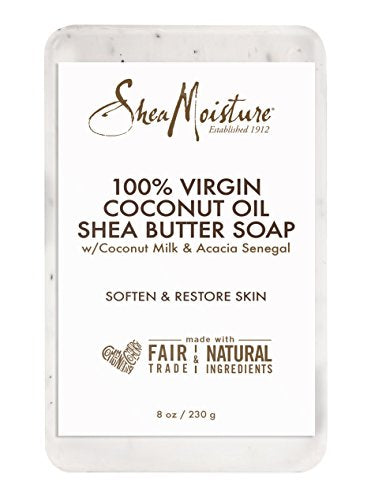
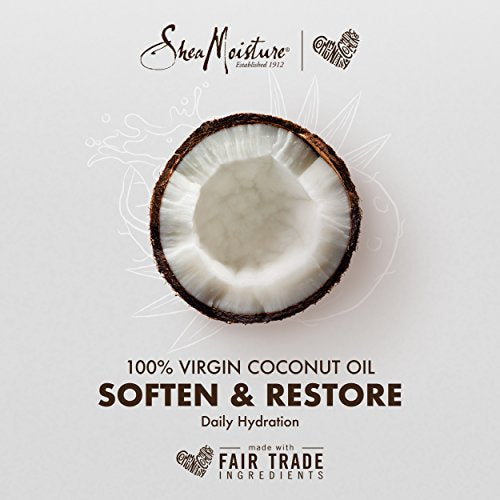
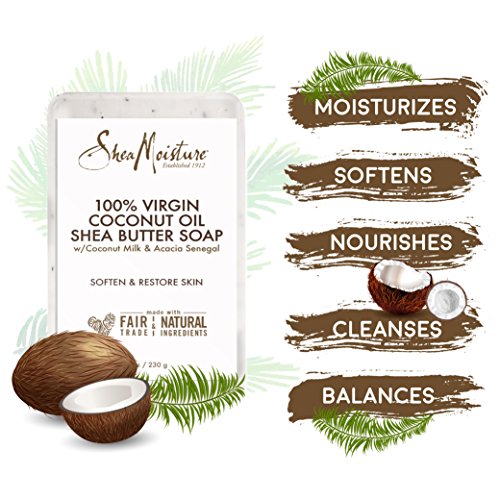
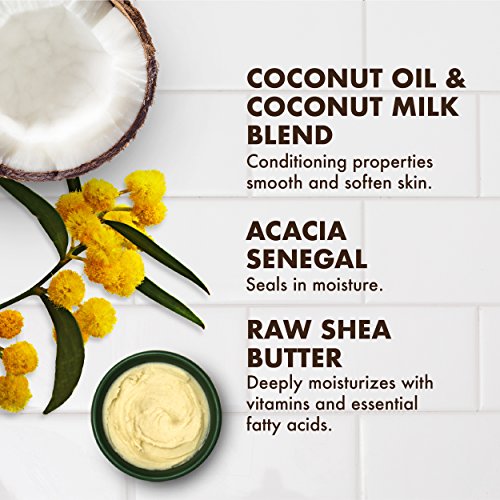
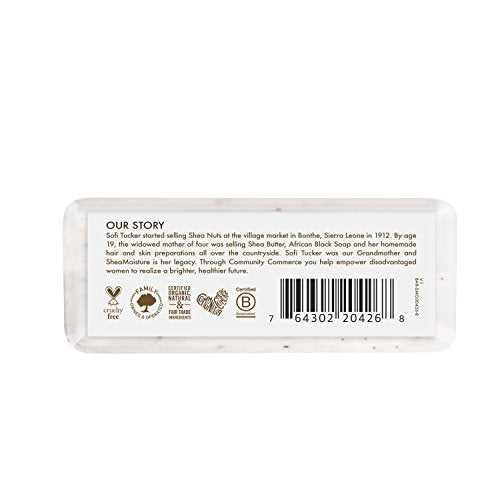

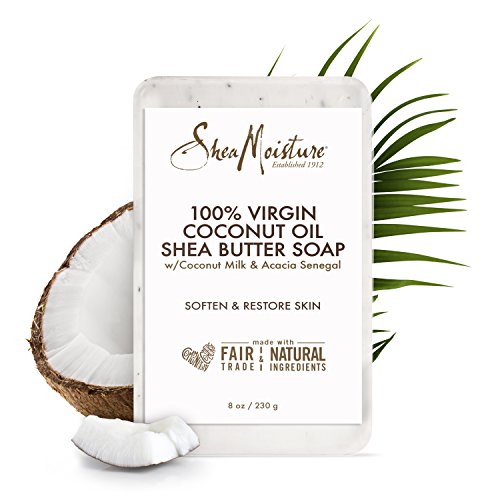

SheaMoisture Bar Soap - Nourishing Coconut Oil & Milk, Softens Skin - 8oz


Fragrance
High RiskFragrance refers to a mixture of aromatic compounds used in products to provide scent. It is commonly listed as 'fragrance' or 'parfum' on product labels and can serve various functions, including enhancing user experience and masking undesirable odors.
Sustai Insights
Fragrance offers functional benefits by improving product appeal; however, it poses significant health risks, notably a high likelihood of causing allergies and allergic contact dermatitis. Environmental risks include potential pollution and endocrine disruption, though its overall carcinogenicity is low. Regulatory bodies have noted concerns regarding its use, leading to a high-risk classification. Safe usage practices should be observed, and alternatives such as natural essential oils are recommended for those sensitive to synthetic fragrances.
Acacia Senegal Gum
Medium RiskAcacia senegal gum is derived from the dried sap of the Acacia senegal tree, primarily used as a thickening agent, emulsifier, and stabilizer in food and cosmetic products. It is recognized for its gelling properties and is often utilized in formulations to improve texture and consistency.
Sustai Insights
Acacia senegal gum offers functional benefits such as emulsification and stabilization in products, and it is biodegradable, which contributes positively to sustainability. Health risks are generally low, with moderate concerns related to allergies. Environmental risks are minimal, although the ingredient is subject to regulatory oversight, including usage restrictions. Overall, the risk level is assessed as medium, and the ingredient should be used according to safety recommendations. Alternatives include other natural gums like guar gum or xanthan gum for similar stabilizing effects.
Glycerin
Medium RiskGlycerin (also called glycerol) is a naturally occurring compound commonly used in personal care and cosmetic products. It functions as a humectant, attracting moisture to the skin, and is also utilized as a solvent and emollient to enhance product texture and stability.
Sustai Insights
Glycerin is valued for its effective moisturizing properties and biodegradability, making it a widely accepted ingredient in formulations. It poses low health risks, including low concerns for carcinogenicity and allergies. However, moderate use restrictions exist due to regulatory guidelines. While glycerin does not significantly contribute to environmental pollution, its production process should be ethically sourced. Overall, glycerin holds a medium risk level, emphasizing the importance of safe usage practices and considering sustainable alternatives.
Titanium Dioxide
Medium RiskTitanium dioxide is an inorganic compound used primarily as a pigment due to its brightness and high refractive index. It is commonly found in products such as paints, coatings, plastics, and cosmetics, providing color and opacity.
Sustai Insights
Titanium dioxide serves effectively as a UV filter and colorant, enhancing product stability and performance. However, it has been classified as a moderate concern for potential carcinogenicity and carries low risks for allergies and reproductive toxicity. Environmental risks include its pollutant potential, though it is not known to bioaccumulate. Regulatory bodies have issued specific restrictions regarding its use, leading to an overall medium risk assessment. Safe usage practices should be observed, with consideration for alternatives such as zinc oxide for a more sustainable option.
Sodium Palm Kernelate
Low RiskSodium palm kernelate is a sodium salt derived from palm kernel oil, commonly used in cosmetic formulations. It acts primarily as a surfactant and emulsifier, aiding in the cleansing and stabilization of products.
Sustai Insights
Sodium palm kernelate offers functional benefits as an effective surfactant and emulsifier, contributing to product stability and cleansing properties. Health risk assessments indicate low concerns regarding carcinogenicity, allergies, or developmental toxicity. Environmental impact is minimal, with no significant pollutant or bioaccumulation risks identified. Regulatory status shows no major restrictions, resulting in an overall low risk assessment. Safe usage practices should be followed, and alternatives like sodium cocoate can be considered for more sustainable options.
Sodium Palmate
Low RiskSodium palmate is the sodium salt of fatty acids derived from palm oil, commonly used as a surfactant and emulsifier in cosmetic formulations. It helps to create lather and improve the texture of products, making it a popular ingredient in soaps and cleansers.
Sustai Insights
Sodium palmate offers functional benefits such as effective cleansing and emulsifying properties, contributing to product stability. It is considered low risk for health concerns, including carcinogenicity and allergenic potential, and has no significant environmental hazards. Regulatory bodies have not imposed restrictions on its use. Safe usage involves adhering to established concentrations, with no major alternatives highlighted. Overall, sodium palmate presents a low risk profile.
Cocos Nucifera (Coconut) Fruit Juice
Low RiskCocos Nucifera (Coconut) Fruit Juice is a liquid derived from the fruit of the coconut palm, widely used in cosmetic formulations for its moisturizing and soothing properties. It serves as a natural humectant, helping to maintain skin hydration and improve texture in various personal care products.
Sustai Insights
Cocos Nucifera (Coconut) Fruit Juice offers functional benefits such as hydration and skin soothing, making it a beneficial ingredient in cosmetics. It is sustainably sourced and biodegradable, contributing positively to environmental considerations. Health risks are low, with no significant concerns regarding carcinogenicity, allergens, or reproductive toxicity. Regulatory bodies impose few restrictions, and overall risk is assessed as low. Safe usage promotes skin health without notable adverse effects. Alternatives include other fruit juices or plant extracts that offer similar moisturizing properties.
Palm Kernel Acid
Low RiskPalm kernel acid is a mixture of fatty acids derived from the kernel of the palm fruit. It is commonly used in cosmetic formulations as an emulsifier and surfactant, contributing to the texture and consistency of creams and lotions.
Sustai Insights
Palm kernel acid offers functional benefits as an effective emulsifier and surfactant, enhancing product stability and texture. It is generally recognized as low-risk for health concerns such as carcinogenicity, allergies, and reproductive toxicity. Environmental assessments indicate low pollutant potential, but it is subject to restrictions in verified products. Overall, palm kernel acid is deemed low risk based on scientific consensus, making it a suitable ingredient in cosmetic formulations.
Palm Acid
Low RiskPalm acid is a mixture of fatty acids derived primarily from palm oil. It serves various functions in cosmetic formulations, including acting as an emulsifier and thickening agent to improve product texture and stability.
Sustai Insights
Palm acid offers functional benefits as an effective emulsifier and stabilizer in cosmetic products. It is derived from palm oil, which raises sustainability concerns regarding deforestation and habitat loss. However, health risks associated with palm acid are minimal, with low concerns for carcinogenicity, allergenic potential, and reproductive toxicity. Regulatory status indicates no significant restrictions. Overall, the ingredient presents a low risk, but alternatives such as synthetic emulsifiers or plant-derived options may be considered for enhanced sustainability.
Sodium Gluconate
Low RiskSodium gluconate is a sodium salt of gluconic acid, commonly used as a chelating agent in various personal care products. It functions primarily to bind metal ions, enhancing product stability and efficacy. Additionally, it may serve as a moisturizer and skin conditioning agent.
Sustai Insights
Sodium gluconate is valued for its functional benefits, including effective chelation and moisture retention, contributing positively to product performance. It is considered low risk concerning health impacts, with minimal concerns regarding carcinogenicity, allergies, or reproductive toxicity. Environmental assessments indicate low pollutant potential and minimal bioaccumulation. Regulatory bodies have not imposed significant restrictions. Safe usage practices are advised, particularly regarding enhanced skin absorption. Overall, sodium gluconate presents a low risk profile, making it a viable choice in personal care formulations.
Cocos Nucifera (Coconut) Shell Powder
Low RiskCocos Nucifera (Coconut) Shell Powder is a finely ground powder derived from the shells of coconuts. It is commonly used in cosmetic formulations for its exfoliating properties, helping to remove dead skin cells and enhance product texture.
Sustai Insights
Cocos Nucifera (Coconut) Shell Powder offers functional benefits as a natural exfoliant and is sustainably sourced, contributing to biodegradability. Health risks are minimal, with low concerns regarding carcinogenicity, allergies, and reproductive toxicity. Environmental risks are also low as it does not significantly pollute or bioaccumulate. Regulatory bodies do not impose restrictions on its use. Overall, its risk level is assessed as low, making it a safe ingredient in cosmetic products.
Water
Low RiskWater is a clear, colorless liquid essential for various biological processes. It serves as a solvent in formulations, facilitating the dissolution of other ingredients and enhancing product texture and application. Additionally, water plays a crucial role in hydration and is a key component in many cosmetic and personal care products.
Sustai Insights
Water is an effective solvent and hydrator, contributing to the texture and efficacy of formulations. It is biodegradable and generally regarded as safe, with low concerns regarding carcinogenicity, allergies, and reproductive toxicity. However, excessive water usage can lead to environmental concerns, particularly regarding resource depletion. Regulatory bodies do not impose restrictions on water use in cosmetics. Overall, the risks associated with water are low, making it a safe and essential ingredient.
Xanthan Gum
Low RiskXanthan gum is a polysaccharide, a sugar-based compound produced by the fermentation of glucose or sucrose. It is commonly used as a thickening agent and stabilizer in various food and cosmetic products due to its ability to improve texture and prevent ingredient separation.
Sustai Insights
Xanthan gum serves effectively as a thickener and stabilizer, enhancing product texture and consistency. It is biodegradable and typically derived from renewable sources, supporting sustainability efforts. Health risks are minimal, with low concerns regarding carcinogenicity, allergies, and reproductive toxicity. Environmental impact is similarly low, posing no significant hazards. Regulatory agencies, including the FDA, regard it as safe for use, with no significant restrictions. Overall, xanthan gum is assessed as low risk, making it a suitable ingredient in formulations.
Sodium Chloride
Low RiskSodium chloride is an inorganic salt commonly known as table salt. It is primarily used in food preservation and flavor enhancement, as well as in various industrial applications. It exists as a crystalline solid and dissolves easily in water, making it effective for diverse uses in food products and other formulations.
Sustai Insights
Sodium chloride serves essential functions in food preservation and flavor enhancement. It is considered safe with low health risks related to cancer, allergies, and reproductive toxicity. Environmental concerns are minimal, as it does not bioaccumulate and poses low pollutant potential. Regulatory bodies, including the FDA, recognize its safety for consumption. Overall, sodium chloride carries a low risk profile, making it a widely accepted ingredient in food and cosmetic products.
Cocos Nucifera (Coconut) Oil
Low RiskCocos Nucifera (Coconut) Oil is derived from the kernels of the coconut palm. It is primarily used in cosmetic formulations for its emollient and moisturizing properties, making it suitable for skin and hair care products.
Sustai Insights
Coconut oil serves as an effective moisturizer and emollient, promoting skin hydration and softness. It is sustainably sourced and biodegradable. Health risks are minimal, with low concerns regarding carcinogenicity, allergens, and reproductive toxicity. Environmental impact is also low, as it does not contribute significantly to pollution or bioaccumulation. Regulatory bodies have not issued restrictions on its use. Overall, coconut oil presents a low risk for health and environmental concerns, making it a safe ingredient in cosmetic products.
Butyrospermum Parkii (Shea) Butter
Low RiskButyrospermum parkii (shea) butter is a vegetable fat derived from the nuts of the shea tree. It is commonly used in cosmetic formulations for its emollient properties, providing moisture and improving skin texture. Additionally, shea butter is known for its ability to enhance the stability of products and deliver a creamy texture.
Sustai Insights
Shea butter offers functional benefits as an effective moisturizer, enhancing skin barrier function and texture. It is sustainably sourced and biodegradable, contributing to eco-friendliness. Health-wise, it is associated with low risks for carcinogenicity, allergies, and reproductive toxicity. Environmental impacts are minimal, with no significant pollutant potential identified. Regulatory assessments indicate no current restrictions. Overall, the ingredient presents a low risk, making it a favorable choice in cosmetic formulations.
Sodium Palm Kernelate
Low RiskSodium palm kernelate is a sodium salt derived from palm kernel oil, commonly used in cosmetic formulations. It acts primarily as a surfactant and emulsifier, aiding in the cleansing and stabilization of products.
Sustai Insights
Sodium palm kernelate offers functional benefits as an effective surfactant and emulsifier, contributing to product stability and cleansing properties. Health risk assessments indicate low concerns regarding carcinogenicity, allergies, or developmental toxicity. Environmental impact is minimal, with no significant pollutant or bioaccumulation risks identified. Regulatory status shows no major restrictions, resulting in an overall low risk assessment. Safe usage practices should be followed, and alternatives like sodium cocoate can be considered for more sustainable options.
Sodium Palmate
Low RiskSodium palmate is the sodium salt of fatty acids derived from palm oil, commonly used as a surfactant and emulsifier in cosmetic formulations. It helps to create lather and improve the texture of products, making it a popular ingredient in soaps and cleansers.
Sustai Insights
Sodium palmate offers functional benefits such as effective cleansing and emulsifying properties, contributing to product stability. It is considered low risk for health concerns, including carcinogenicity and allergenic potential, and has no significant environmental hazards. Regulatory bodies have not imposed restrictions on its use. Safe usage involves adhering to established concentrations, with no major alternatives highlighted. Overall, sodium palmate presents a low risk profile.
Cocos Nucifera (Coconut) Fruit Juice
Low RiskCocos Nucifera (Coconut) Fruit Juice is a liquid derived from the fruit of the coconut palm, widely used in cosmetic formulations for its moisturizing and soothing properties. It serves as a natural humectant, helping to maintain skin hydration and improve texture in various personal care products.
Sustai Insights
Cocos Nucifera (Coconut) Fruit Juice offers functional benefits such as hydration and skin soothing, making it a beneficial ingredient in cosmetics. It is sustainably sourced and biodegradable, contributing positively to environmental considerations. Health risks are low, with no significant concerns regarding carcinogenicity, allergens, or reproductive toxicity. Regulatory bodies impose few restrictions, and overall risk is assessed as low. Safe usage promotes skin health without notable adverse effects. Alternatives include other fruit juices or plant extracts that offer similar moisturizing properties.
Palm Kernel Acid
Low RiskPalm kernel acid is a mixture of fatty acids derived from the kernel of the palm fruit. It is commonly used in cosmetic formulations as an emulsifier and surfactant, contributing to the texture and consistency of creams and lotions.
Sustai Insights
Palm kernel acid offers functional benefits as an effective emulsifier and surfactant, enhancing product stability and texture. It is generally recognized as low-risk for health concerns such as carcinogenicity, allergies, and reproductive toxicity. Environmental assessments indicate low pollutant potential, but it is subject to restrictions in verified products. Overall, palm kernel acid is deemed low risk based on scientific consensus, making it a suitable ingredient in cosmetic formulations.
Palm Acid
Low RiskPalm acid is a mixture of fatty acids derived primarily from palm oil. It serves various functions in cosmetic formulations, including acting as an emulsifier and thickening agent to improve product texture and stability.
Sustai Insights
Palm acid offers functional benefits as an effective emulsifier and stabilizer in cosmetic products. It is derived from palm oil, which raises sustainability concerns regarding deforestation and habitat loss. However, health risks associated with palm acid are minimal, with low concerns for carcinogenicity, allergenic potential, and reproductive toxicity. Regulatory status indicates no significant restrictions. Overall, the ingredient presents a low risk, but alternatives such as synthetic emulsifiers or plant-derived options may be considered for enhanced sustainability.
Sodium Gluconate
Low RiskSodium gluconate is a sodium salt of gluconic acid, commonly used as a chelating agent in various personal care products. It functions primarily to bind metal ions, enhancing product stability and efficacy. Additionally, it may serve as a moisturizer and skin conditioning agent.
Sustai Insights
Sodium gluconate is valued for its functional benefits, including effective chelation and moisture retention, contributing positively to product performance. It is considered low risk concerning health impacts, with minimal concerns regarding carcinogenicity, allergies, or reproductive toxicity. Environmental assessments indicate low pollutant potential and minimal bioaccumulation. Regulatory bodies have not imposed significant restrictions. Safe usage practices are advised, particularly regarding enhanced skin absorption. Overall, sodium gluconate presents a low risk profile, making it a viable choice in personal care formulations.
Acacia Senegal Gum
Medium RiskAcacia senegal gum is derived from the dried sap of the Acacia senegal tree, primarily used as a thickening agent, emulsifier, and stabilizer in food and cosmetic products. It is recognized for its gelling properties and is often utilized in formulations to improve texture and consistency.
Sustai Insights
Acacia senegal gum offers functional benefits such as emulsification and stabilization in products, and it is biodegradable, which contributes positively to sustainability. Health risks are generally low, with moderate concerns related to allergies. Environmental risks are minimal, although the ingredient is subject to regulatory oversight, including usage restrictions. Overall, the risk level is assessed as medium, and the ingredient should be used according to safety recommendations. Alternatives include other natural gums like guar gum or xanthan gum for similar stabilizing effects.
Cocos Nucifera (Coconut) Shell Powder
Low RiskCocos Nucifera (Coconut) Shell Powder is a finely ground powder derived from the shells of coconuts. It is commonly used in cosmetic formulations for its exfoliating properties, helping to remove dead skin cells and enhance product texture.
Sustai Insights
Cocos Nucifera (Coconut) Shell Powder offers functional benefits as a natural exfoliant and is sustainably sourced, contributing to biodegradability. Health risks are minimal, with low concerns regarding carcinogenicity, allergies, and reproductive toxicity. Environmental risks are also low as it does not significantly pollute or bioaccumulate. Regulatory bodies do not impose restrictions on its use. Overall, its risk level is assessed as low, making it a safe ingredient in cosmetic products.
Water
Low RiskWater is a clear, colorless liquid essential for various biological processes. It serves as a solvent in formulations, facilitating the dissolution of other ingredients and enhancing product texture and application. Additionally, water plays a crucial role in hydration and is a key component in many cosmetic and personal care products.
Sustai Insights
Water is an effective solvent and hydrator, contributing to the texture and efficacy of formulations. It is biodegradable and generally regarded as safe, with low concerns regarding carcinogenicity, allergies, and reproductive toxicity. However, excessive water usage can lead to environmental concerns, particularly regarding resource depletion. Regulatory bodies do not impose restrictions on water use in cosmetics. Overall, the risks associated with water are low, making it a safe and essential ingredient.
Glycerin
Medium RiskGlycerin (also called glycerol) is a naturally occurring compound commonly used in personal care and cosmetic products. It functions as a humectant, attracting moisture to the skin, and is also utilized as a solvent and emollient to enhance product texture and stability.
Sustai Insights
Glycerin is valued for its effective moisturizing properties and biodegradability, making it a widely accepted ingredient in formulations. It poses low health risks, including low concerns for carcinogenicity and allergies. However, moderate use restrictions exist due to regulatory guidelines. While glycerin does not significantly contribute to environmental pollution, its production process should be ethically sourced. Overall, glycerin holds a medium risk level, emphasizing the importance of safe usage practices and considering sustainable alternatives.
Fragrance
High RiskFragrance refers to a mixture of aromatic compounds used in products to provide scent. It is commonly listed as 'fragrance' or 'parfum' on product labels and can serve various functions, including enhancing user experience and masking undesirable odors.
Sustai Insights
Fragrance offers functional benefits by improving product appeal; however, it poses significant health risks, notably a high likelihood of causing allergies and allergic contact dermatitis. Environmental risks include potential pollution and endocrine disruption, though its overall carcinogenicity is low. Regulatory bodies have noted concerns regarding its use, leading to a high-risk classification. Safe usage practices should be observed, and alternatives such as natural essential oils are recommended for those sensitive to synthetic fragrances.
Xanthan Gum
Low RiskXanthan gum is a polysaccharide, a sugar-based compound produced by the fermentation of glucose or sucrose. It is commonly used as a thickening agent and stabilizer in various food and cosmetic products due to its ability to improve texture and prevent ingredient separation.
Sustai Insights
Xanthan gum serves effectively as a thickener and stabilizer, enhancing product texture and consistency. It is biodegradable and typically derived from renewable sources, supporting sustainability efforts. Health risks are minimal, with low concerns regarding carcinogenicity, allergies, and reproductive toxicity. Environmental impact is similarly low, posing no significant hazards. Regulatory agencies, including the FDA, regard it as safe for use, with no significant restrictions. Overall, xanthan gum is assessed as low risk, making it a suitable ingredient in formulations.
Sodium Chloride
Low RiskSodium chloride is an inorganic salt commonly known as table salt. It is primarily used in food preservation and flavor enhancement, as well as in various industrial applications. It exists as a crystalline solid and dissolves easily in water, making it effective for diverse uses in food products and other formulations.
Sustai Insights
Sodium chloride serves essential functions in food preservation and flavor enhancement. It is considered safe with low health risks related to cancer, allergies, and reproductive toxicity. Environmental concerns are minimal, as it does not bioaccumulate and poses low pollutant potential. Regulatory bodies, including the FDA, recognize its safety for consumption. Overall, sodium chloride carries a low risk profile, making it a widely accepted ingredient in food and cosmetic products.
Titanium Dioxide
Medium RiskTitanium dioxide is an inorganic compound used primarily as a pigment due to its brightness and high refractive index. It is commonly found in products such as paints, coatings, plastics, and cosmetics, providing color and opacity.
Sustai Insights
Titanium dioxide serves effectively as a UV filter and colorant, enhancing product stability and performance. However, it has been classified as a moderate concern for potential carcinogenicity and carries low risks for allergies and reproductive toxicity. Environmental risks include its pollutant potential, though it is not known to bioaccumulate. Regulatory bodies have issued specific restrictions regarding its use, leading to an overall medium risk assessment. Safe usage practices should be observed, with consideration for alternatives such as zinc oxide for a more sustainable option.
Cocos Nucifera (Coconut) Oil
Low RiskCocos Nucifera (Coconut) Oil is derived from the kernels of the coconut palm. It is primarily used in cosmetic formulations for its emollient and moisturizing properties, making it suitable for skin and hair care products.
Sustai Insights
Coconut oil serves as an effective moisturizer and emollient, promoting skin hydration and softness. It is sustainably sourced and biodegradable. Health risks are minimal, with low concerns regarding carcinogenicity, allergens, and reproductive toxicity. Environmental impact is also low, as it does not contribute significantly to pollution or bioaccumulation. Regulatory bodies have not issued restrictions on its use. Overall, coconut oil presents a low risk for health and environmental concerns, making it a safe ingredient in cosmetic products.
Butyrospermum Parkii (Shea) Butter
Low RiskButyrospermum parkii (shea) butter is a vegetable fat derived from the nuts of the shea tree. It is commonly used in cosmetic formulations for its emollient properties, providing moisture and improving skin texture. Additionally, shea butter is known for its ability to enhance the stability of products and deliver a creamy texture.
Sustai Insights
Shea butter offers functional benefits as an effective moisturizer, enhancing skin barrier function and texture. It is sustainably sourced and biodegradable, contributing to eco-friendliness. Health-wise, it is associated with low risks for carcinogenicity, allergies, and reproductive toxicity. Environmental impacts are minimal, with no significant pollutant potential identified. Regulatory assessments indicate no current restrictions. Overall, the ingredient presents a low risk, making it a favorable choice in cosmetic formulations.
Discover the SheaMoisture 100% Virgin Oil Butter Soap with Coconut, a nourishing bar soap crafted to cleanse and restore your skin's natural softness. Infused with 100% coconut oil, coconut milk, and Acacia Senegal, this soap is designed for those who prioritize both health and sustainability in their daily routine.
- Nourishing Cleanse: This nutrient-rich soap effectively cleanses while softening the skin, making it perfect for daily use.
- Hydration Boost: The unique blend of coconut oil and coconut milk provides intense hydration, leaving your skin feeling moisturized and refreshed.
- Gentle and Restorative: Ideal for all skin types, it gently massages away impurities without stripping natural oils.
- Sustainable Ingredients: Committed to ethical sourcing, this soap is made with environmentally friendly ingredients that support sustainable practices.
- Easy to Use: Simply wet your skin, lather the soap, massage, rinse, and pat dry for consistently soft and nourished skin.
Elevate your cleansing routine with this eco-conscious choice that not only cares for your skin but also supports a sustainable future.
Subscribe & Save with Sustai
- Best Price Guarantee: Always enjoy the lowest prices on sustainable home essentials.
- No Surprises: We’ll notify you before shipping. No hidden fees, ever.
- You’re in Charge: Change, pause, or cancel your subscription anytime with ease.
- Eco-Friendly Deliveries: Our grouped shipments mean less packaging and lower emissions.
Join us on a sustainable journey. Special offers for a limited time! Prices and promotions may change.
Recommended Products
Discover the SheaMoisture 100% Virgin Oil Butter Soap with Coconut, a nourishing bar soap crafted to cleanse and restore your skin's natural softness. Infused with 100% coconut oil, coconut milk, and Acacia Senegal, this soap is designed for those who prioritize both health and sustainability in their daily routine.
- Nourishing Cleanse: This nutrient-rich soap effectively cleanses while softening the skin, making it perfect for daily use.
- Hydration Boost: The unique blend of coconut oil and coconut milk provides intense hydration, leaving your skin feeling moisturized and refreshed.
- Gentle and Restorative: Ideal for all skin types, it gently massages away impurities without stripping natural oils.
- Sustainable Ingredients: Committed to ethical sourcing, this soap is made with environmentally friendly ingredients that support sustainable practices.
- Easy to Use: Simply wet your skin, lather the soap, massage, rinse, and pat dry for consistently soft and nourished skin.
Elevate your cleansing routine with this eco-conscious choice that not only cares for your skin but also supports a sustainable future.

You can have at most 2 Sustainable Steals products in your cart
Customer Reviews
Customers’ View
Customers appreciate the nourishing and gentle cleansing properties of SheaMoisture's bar soap. Many users highlight its ability to leave skin feeling soft and hydrated without causing dryness, with one reviewer noting, 'I always feel clean and never dried out' after regular use. The soap is praised for its rich lather and pleasant scent, with customers mentioning that it lasts a long time, making it a cost-effective choice. Additionally, the product's formulation with natural and organic ingredients resonates well with health-conscious consumers. Overall, customers find this soap effective and suitable for various skin types, aligning with their values of sustainability and wellness.
AI-generated from the text of customer reviewsThis product is rated 5.0 of 5.0 stars.
It has received 3 reviews.





